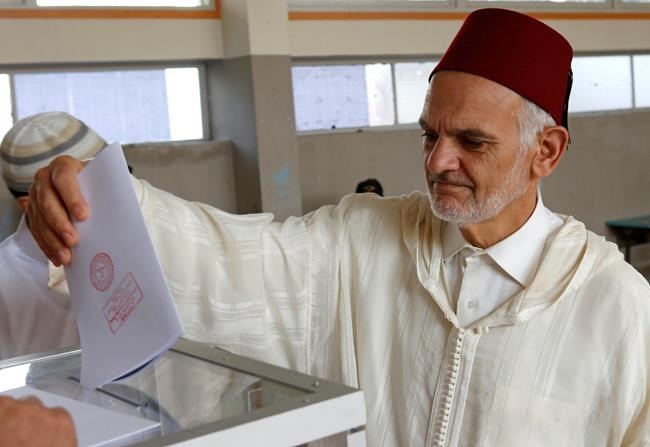
A Moroccan man casts his ballot at a polling station for the parliamentary elections, in Rabat, Morocco, Friday, Oct. 7, 2016. Amid worries about jobs and extremism, millions of Moroccans voted Friday in parliamentary elections that will determine whether moderate Islamists will keep control of the government or lose power to a young rival party close to the powerful royal palace.(AP Photo/Abdeljalil Bounhar)
Republished October 09, 2016 - 4:50 AM
Original Publication Date October 09, 2016 - 3:25 AM
RABAT, Morocco - Voting in Morocco last week was largely free and fair, the country's election observer body said Sunday, but it is investigating some cases of vote-buying and expressed concern about low turnout.
The moderate Islamist Party of Justice and Development won Friday's legislative election, beating out a party with close ties to the royal palace after an unusually hostile campaign. The PJD, which has led a coalition government since it first won elections in 2011 on a wave of Arab Spring protests, is now working on building a new coalition with rival parties.
The Interior Ministry said the PJD won 125 of the 395 seats in the Chamber of Representatives, while the Party of Authenticity and Modernity, founded by an adviser to the king, came second with 102 seats.
The National Council of Human Rights, which oversees election monitoring, released a preliminary report Sunday noting sporadic irregularities. They included 37 cases of vote buying by people distributing bags of wheat or up to 500 dirhams ($51) in cash.
Abderrazak El Hanouchi, chief of staff to the council's president, would not divulge the names of the parties involved, saying that would be released later in a full report.
Such cases appeared rare. Council president Driss El Yazami told reporters the elections took place in a "serene and transparent climate."
However, he expressed concern about the 43 per cent turnout rate. The report recommended a study into why most Moroccans don't vote.
Experts see the result as a generally positive sign for Morocco's democracy and reform movement, which was unleashed in 2011. The movement is pushing for less centralized control by the royal palace and more genuine political debate.
Despite a new constitution, many Moroccans still see elections as futile because major policy decisions rest with King Mohammed VI and the royal palace. A popular Islamist movement, Adl Wal Ihsan (Justice and Charity), was among those boycotting Friday's vote.
The report also recommended increasing the number of women election workers, make voting stations more accessible to the disabled and allowing Moroccans living abroad to take part.
News from © The Associated Press, 2016